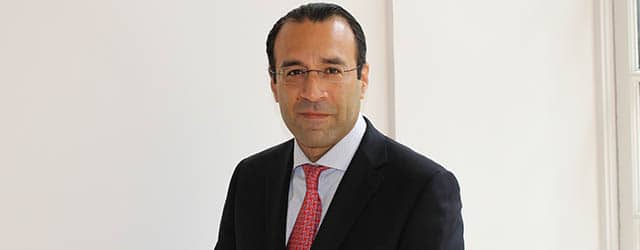Global Salon

Global Finance sat down with José Gerardo Morales, Chief Investment Officer of Mirae Asset Global Investments (USA), to discuss challenges and opportunities in emerging markets, and the state of geopolitical risk in 2015.
Global Finance: What are the main investment themes and challenges in 2015 for emerging markets?
José Gerardo Morales: Global growth is improving but remains pretty fragile—3.5% growth for this year—and emerging markets still remain an important part of this growth. Its share of global GDP is rising. But the gap between level of growth in emerging markets and that of developed markets is shrinking. The IMF itself earlier this year downgraded growth for emerging markets.
The stronger dollar is negative for commodity producers because it puts pressure on commodity prices. It also puts pres- sure on countries with large current-account deficits, and [on] those countries that have high levels of foreign exchange debt: [Emerging markets] corporations tripled the foreign exchange debt that they have taken on in the last 10 years, especially in Asia. [However], the strong dollar helps the vast majority of emerging markets [as it] supports consumption and provides lower inflation for these countries. That, in turn, gives them policy flexibility. Geopolitical risk remains high.
GF: What is your investment process?
Morales: It is a bottom-up strategy. I look at a company and focus mainly on its operations, financials, cash flow, and if it gives me the exposure to secular growth I am looking for. We look at the macro for risk management. The macro risk can be so high due to politics or currency that we avoid [a country] or reduce expo- sure. For example, we will not invest in Venezuela. Argentina was on this list until recently. India [in contrast] is the proxy now for improving sustainable growth.
GF: What opportunities do you see in emerging markets, and in which sectors?
Morales: We are bullish on the consumption theme in emerging markets. Within Asia, a popular theme is “inspirational con- sumption,” [meaning] shopping for luxury items or entertain- ment. Chinese like to travel, and one of our biggest holdings is a duty-free-hotel operator in Korea, [where] 50% of revenues come from Chinese tourists. In Mexico, air traffic growth over the last 10 years has been two to four times GDP growth, and we have exposure to Mexican airports. In Asean region the trend is snacking. We find local companies that give us access to that. Healthcare is taking off in China, [and] funding of generic pharmaceutical companies, like in India 10 years ago.
GF: Do you have any exposure to emerging markets in Africa? Morales: South Africa is one of the Fragile Four countries. It has 1.5% growth expected for this year, but it is fragile because it is open to strikes, productivity falls, and they demand higher real wages. Low prices for metals, which are a key export for them, do not help; inflation is a problem. Having said that, what drives our decision-making is a company analysis, [and] through South Africa we get incredible exposure to continental Africa— countries like Nigeria, which grows very strongly, and Kenya. GF: Mirae Asset Global Investments is a Korean corporation with global operations. What is unique about a Korean approach to investing in emerging markets?
Morales: We are emerging markets people. It is not an asset class for us, [but] the only thing we do. Koreans, being from an emerging market, have a different perspective on what risk is. Whereas a company that was founded in the US or Europe might get nervous when emerging markets start becoming vola- tile, Koreans grew up with it and can handle volatility better.



